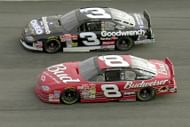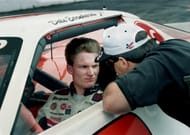The 2001 NASCAR season was supposed to be a continuation of Dale Earnhardt Jr.'s rise. He was two years into his Cup Series career, partnered with a legacy team and backed by Budweiser. But after the tragic death of Dale Earnhardt Sr. in the Daytona 500, the weight of expectations shifted instantly.
Suddenly, Dale Jr. wasn't just a driver for Dale Earnhardt Inc. (DEI) anymore. He became a symbol, a carrier of legacy, and a young man navigating grief without the one person who had always been his compass. More than two decades later, Earnhardt Jr. admitted in a 2022 interview with the Charlotte Observer's Scott Fowler that he didn't fully grasp what it would take to be great without his father.
"I didn't realize the work ethic needed to be as great as I could possibly be... I got partnered up with Budweiser, which, had dad lived, he would've probably encouraged me, successfully, to be better at applying myself," he said (0:22 onwards)
Dale Earnhardt Jr.'s emotional honesty shows a man in the harshest spotlight motorsports could offer.
Budweiser signed with him before the 2000 season, when he moved to full-time Cup racing with DEI. The pairing became iconic as his red No. 8 Chevrolet became a staple on posters, die-casts, and merchandise racks.

Of his 26 career Cup Series wins, 15 came under the Budweiser banner between 2000 and 2007 with DEI. The stretch included unforgettable wins, including the Daytona 500 in 2004, exactly six years after his father's passing in a six-win season, that put him within reach of a championship.
And yet, for all his popularity and flashes of dominance, something never fully clicked. He didn't lack talent, the team around him was strong, the equipment was elite, but the intangible mentorship and tough love Dale Sr. provided were gone.
"My leadership is gone": The freedom that left Dale Earnhardt Jr. lost

For Dale Earnhardt Jr., the void wasn't only professional, it was deeply personal. In the same 2022 interview, he revealed how he felt once his father was gone.
"I had this odd, odd strange feeling of being freed from some limitation or some sort of mental binding. Dad (Dale Earnhardt Sr.) was always a ceiling to protect me... he was this sort of protective Ozone layer. And that was gone, and now I had this feeling of some sort of freedom, that was very dangerous. And scary, like, where's my leader?...my leadership is gone" added Dale Jr. (1:28 onwards)
There was no championship run in the immediate years after his father's death. 2003 looked like the breakout year, until it wasn't. He was third in points, a consistent threat, but not consistent enough to unseat the elite. 2004 was better, his six wins tying Jeff Gordon for most that season, but a poor chase performance dropped him to fifth.
He would never finish higher in the standings again, with two fifth-place finishes in 2006 and 2013. The Most Popular Driver every year from 2003 to 2017, Earnhardt Jr. became the people's champion, but not NASCAR's. The freedom he spoke of wasn't liberating but isolating.

It's hard not to look at his career in two parts, before and after 2001. He became an ambassador, a team owner, and eventually a Hall of Famer. His 26 Cup Series wins remain a remarkable achievement.
But in his own words, perhaps the greatest victory was simply learning to lead himself in a world without Dale Earnhardt Sr.
Get the latest NASCAR All-Star race news, Xfinity Series updates, breaking news, rumors, and today’s top stories with the latest news on NASCAR.
